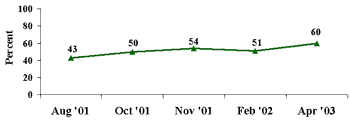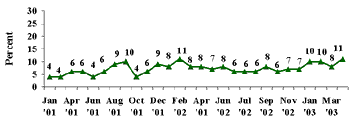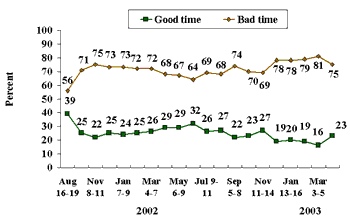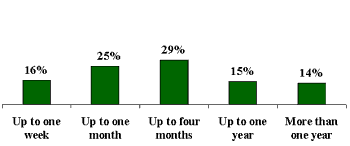GALLUP NEWS SERVICE
PRINCETON, NJ -- The consequences of a continuing slow economy are becoming more evident in recent Gallup Poll data. Roughly six in 10 Americans now say they know someone who was laid off or fired recently, the highest percentage on this measure since the economic boom of the late 1990s ended. An increasing number of Americans cite unemployment or jobs as the most important problem facing the country, and only about one in five believe now is a good time to find a quality job in the United States. A substantial proportion of Americans say they could survive without a job for only about a month before "experiencing significant financial hardship."
An April 7-9 Gallup Poll finds 60% of Americans saying they know someone who has been laid off or fired recently. Since the recent economic downturn began, the percentage has increased steadily. In August 2001, 43% said they knew someone who had been laid off or fired recently. Then by October 2001, the percentage had grown to half of Americans, and stayed in the low 50% range until the current reading.
| Do You Know Somebody Who Has Been Laid Off or
Fired Recently? (Percent Yes) |
 |
An alternate version of this question asked the public if they know someone who has "been laid off or lost their job within the last six months." This version yielded similar results -- 63% of Americans say they know someone who has been laid off or lost their job within the last six months, while 37% do not.
National Job Outlook Remains Bleak
The most recent poll finds 11% of Americans saying jobs or unemployment constitute the most important problem facing the country, making it the third most commonly mentioned issue behind the economy (31%) and the situation in Iraq (16%). The percentage mentioning jobs or unemployment has increased steadily in recent months -- as recently as October only 6% did so – and the current level is the highest since the economic boom ended. Including those who mention jobs or unemployment, nearly half of Americans (48%) mention some economic issue as the most important problem.
| Unemployment as Most Important
Problem (Percent of Americans mentioning) |
 |
When Americans are asked if now is a good time to find a quality job, the answer has been a resounding "no" for the 19 straight months since Gallup began asking this question on a routine basis in October 2001. According to the most recent Gallup Poll, just 23% of Americans say now is a good time to find a quality job, while an overwhelming 75% say it is a bad time. In the months leading up to the war in Iraq, only about one in five Americans said it was a good time to find a quality job. Prior to that, this percentage was only slightly higher (generally in the mid-20% range).
| Perceptions of Current Climate for Finding a
Quality Job Among National Adults |
 |
Since October 2001, Gallup has also been regularly tracking Americans' views as to whether unemployment will increase, remain the same, or decrease over the next six months. More Americans have said unemployment will increase rather than decrease throughout this time period. Gallup's latest reading, from an April 7-9 poll, finds 43% expect unemployment to go up in the next six months, while 33% say it will go down, and 22% think it will stay the same.
Significant Numbers of Employed Americans Would Need to Find Job Quickly if Laid Off
Some personal finance experts recommend that people have six months' worth of living expenses saved in the event they become unemployed. The poll finds very few currently employed Americans who approach that standard. In fact, four in 10 employed Americans say they could be jobless for only one month before experiencing significant financial hardship, including 16% who say they could be unemployed for only one week. An additional 29% say they could survive up to four months before putting major stress on their finances, and slightly fewer than one in three employed Americans (29%) could live comfortably for a year or more before finding a new job.
| If You Lose Your Job, How Long Could You Go
Before Experiencing Financial Hardship? (Among Those Currently Employed) |
 |
| April 7-9, 2003 |
These numbers are slightly more positive than those observed in a February 2001 Gallup Poll. At that time, nearly half of employed Americans, 46%, said they could go without a job for only a month or less before experiencing hardship, while only 23% could live comfortably for up to a year or more.
Not surprisingly, the length of time one could survive before finding a job is strongly related to one's income. The current poll shows about two in three (65%) employed Americans whose household income is less than $30,000 saying they could go one month or less before finding a job without experiencing financial hardship. This percentage declines to 47% of employed adults whose household income is between $30,000 and $50,000, and to 25% of those in households whose income is $50,000 or more.
There is also a strong relationship to age. More than half (55%) of employed Americans between the ages of 18 and 34 could survive only up to a month before finding a new job. This compares with 31% of employed Americans between the ages of 35 and 44, and 25% of employed Americans age 45 and older.
Survey Methods
These results are based on telephone interviews with a randomly selected national sample of 1,018 adults, 18 years and older, conducted April 7-9, 2003. For results based on this sample, one can say with 95 percent confidence that the maximum error attributable to sampling and other random effects is plus or minus 3 percentage points. In addition to sampling error, question wording and practical difficulties in conducting surveys can introduce error or bias into the findings of public opinion polls.
Over the next six months, do you think that each of the following will -- [ROTATED: go up a lot, go up a little, remain the same, go down a little, (or) go down a lot]? How about -- [RANDOM ORDER]?
Unemployment
|
|
|
|
|
Go down |
Go down |
|
|
% |
% |
% |
% |
% |
% |
|
|
2003 Apr 7-9 |
17 |
26 |
22 |
26 |
7 |
2 |
|
2003 Jan 13-16 |
19 |
29 |
16 |
26 |
9 |
1 |
|
2002 Nov 11-14 |
17 |
30 |
22 |
21 |
7 |
3 |
|
2002 Aug 5-8 |
16 |
29 |
23 |
22 |
7 |
3 |
|
2002 Jul 9-11 |
19 |
28 |
22 |
24 |
6 |
1 |
|
2002 Jun 3-6 |
14 |
32 |
22 |
25 |
5 |
2 |
|
2002 May 6-9 |
15 |
31 |
22 |
24 |
7 |
1 |
|
2002 Apr 8-11 |
19 |
28 |
20 |
25 |
7 |
1 |
|
2002 Mar 4-7 |
13 |
30 |
18 |
30 |
8 |
1 |
|
2002 Feb 4-6 |
12 |
31 |
17 |
29 |
10 |
1 |
|
2002 Jan 7-9 |
16 |
30 |
18 |
26 |
9 |
1 |
|
2001 Dec 6-9 |
18 |
30 |
17 |
24 |
10 |
1 |
|
2001 Nov 8-11 |
21 |
31 |
13 |
23 |
11 |
1 |
|
2001 Oct 11-14 |
20 |
31 |
15 |
20 |
13 |
1 |
|
Good time |
Bad time |
No opinion |
||
|
% |
% |
% |
||
|
national adults |
||||
|
2003 Apr 7-9 |
23 |
75 |
2 |
|
|
2003 Mar 3-5 |
16 |
81 |
3 |
|
|
2003 Feb 3-6 |
19 |
79 |
2 |
|
|
2003 Jan 13-16 |
20 |
78 |
2 |
|
|
2002 Dec 5-8 |
19 |
78 |
3 |
|
|
2002 Nov 11-14 |
27 |
69 |
4 |
|
|
2002 Oct 14-17 |
23 |
70 |
7 |
|
|
2002 Sep 5-8 |
22 |
74 |
4 |
|
|
2002 Aug 5-8 |
27 |
68 |
5 |
|
|
2002 Jul 9-11 |
26 |
69 |
5 |
|
|
2002 Jun 3-6 |
32 |
64 |
4 |
|
|
2002 May 6-9 |
29 |
67 |
4 |
|
|
2002 Apr 8-11 |
29 |
68 |
3 |
|
|
2002 Mar 4-7 |
26 |
72 |
2 |
|
|
2002 Feb 4-6 |
25 |
72 |
3 |
|
|
2002 Jan 7-9 |
24 |
73 |
3 |
|
|
2001 Dec 6-9 |
25 |
73 |
2 |
|
|
2001 Nov 8-11 |
22 |
75 |
3 |
|
|
2001 Oct 11-14 |
25 |
71 |
4 |
|
|
2001 Aug 16-19 |
39 |
56 |
5 |
|
|
Employed adults or unemployed but looking for work ^ |
||||
|
2003 Apr 7-9 |
23 |
76 |
1 |
|
|
2003 Mar 3-5 |
16 |
82 |
2 |
|
|
2003 Feb 3-6 |
20 |
79 |
1 |
|
|
2003 Jan 13-16 |
20 |
78 |
2 |
|
|
2002 Dec 5-8 |
20 |
77 |
3 |
|
|
2002 Nov 11-14 |
29 |
68 |
3 |
|
|
2002 Oct 14-17 |
24 |
70 |
6 |
|
|
2002 Sep 5-8 |
23 |
75 |
2 |
|
|
2002 Aug 5-8 |
29 |
68 |
3 |
|
|
2002 Jul 9-11 |
28 |
68 |
4 |
|
|
2002 Jun 3-6 |
35 |
62 |
3 |
|
|
2002 May 6-9 |
30 |
67 |
3 |
|
|
2002 Apr 8-11 |
30 |
68 |
2 |
|
|
2002 Mar 4-7 |
28 |
70 |
2 |
|
|
2002 Feb 4-6 |
24 |
73 |
3 |
|
|
2002 Jan 7-9 |
24 |
73 |
3 |
|
|
2001 Dec 6-9 |
26 |
71 |
3 |
|
|
2001 Nov 8-11 |
22 |
75 |
3 |
|
|
2001 Oct 11-14 |
26 |
71 |
3 |
|
|
2001 Aug 16-19 |
38 |
59 |
3 |
|
|
2000 Aug 4-31 † |
78 |
16 |
6 |
|
|
2000 Jan 5-19 † |
76 |
19 |
5 |
|
|
1999 Feb 5-22 † |
70 |
24 |
6 |
|
|
1998 Aug 5-16 † |
69 |
25 |
6 |
|
|
^ |
BASED ON --690-- EMPLOYED ADULTS OR UNEMPLOYED ADULTS WHO ARE LOOKING FOR WORK |
|||
|
† |
Center for Survey Research & Analysis, Univ. of Connecticut & John J. Heldrich Center for Workforce Development at Rutgers Univ. |
|||
Do you know someone, personally, who has been laid off or fired recently, or not?
BASED ON -- 496 -- NATIONAL ADULTS
|
|
Yes |
No |
No opinion |
|
|
% |
% |
% |
||
|
2003 Apr 7-9 |
60 |
40 |
-- |
|
|
2002 Feb 4-6 |
51 |
49 |
* |
|
|
2001 Nov 8-11 |
54 |
46 |
* |
|
|
2001 Oct 11-14 |
50 |
50 |
* |
|
|
2001 Aug 16-19 ^ |
43 |
57 |
* |
|
|
1996 Apr 9-10 † |
58 |
42 |
* |
|
|
1994 Mar 7-8 † |
60 |
40 |
* |
|
|
1993 Dec 4-6 † |
52 |
47 |
1 |
|
|
1991 Oct 17-20 † |
50 |
46 |
* |
|
|
1990 Oct 25-26 † |
50 |
49 |
1 |
|
|
^ |
Asked of half sample. |
|||
|
† |
WORDING: Which of the following statements apply to you... You know people outside of your family who have been laid off or fired recently? |
|||
Do you, personally, know anyone who has been laid off or lost their job within the last six months, or not?
BASED ON -- 522 -- NATIONAL ADULTS
|
|
Yes |
No |
No opinion |
|
2003 Apr 7-9 |
63% |
37 |
-- |
If you were to lose your job, how long could you go without a job before experiencing significant financial hardship – up to one week, up to one month, up to four months, up to one year, (or) more than one year?
BASED ON -- 650 -- ADULTS EMPLOYED FULL OR PART-TIME
|
Up to one |
Up to one month |
Up to four months |
Up to |
More than |
|
|
|
2003 Apr 7-9 |
16% |
25 |
29 |
15 |
14 |
1 |
|
2001 Feb 9-11 |
15% |
31 |
30 |
13 |
10 |
1 |
* -- less than 0.5%
